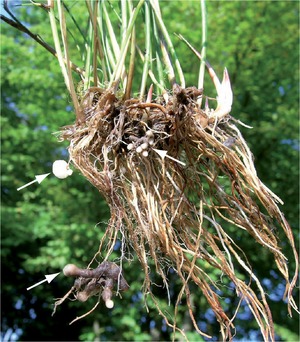Entorrhiza
| Entorrhiza | ||||||||||||
|---|---|---|---|---|---|---|---|---|---|---|---|---|

Galls on roots of the limb rush produced by Entorrhiza casparyana . |
||||||||||||
| Systematics | ||||||||||||
|
||||||||||||
| Scientific name of the department | ||||||||||||
| Entorrhizomycota | ||||||||||||
| R. Bauer , Garnica, Oberw. , K. Riess, M. Weiß & Begerow | ||||||||||||
| Scientific name of the class | ||||||||||||
| Entorrhizomycetes | ||||||||||||
| Begerow, Stoll & R. Bauer | ||||||||||||
| Scientific name of the order | ||||||||||||
| Entorrhizales | ||||||||||||
| R. Bauer & Oberw. | ||||||||||||
| Scientific name of the family | ||||||||||||
| Entorrhizaceae | ||||||||||||
| R. Bauer & Oberw. | ||||||||||||
| Scientific name of the genus | ||||||||||||
| Entorrhiza | ||||||||||||
| CA Weber |
Entorrhiza is a systematically isolated genus of the mushrooms (Basidiomycota), whichformsits own division Entorrhizomycota .
Features and way of life
Entorrhiza are plant parasites . They develop in the roots of Cyperaceae and Juncaceae and lead to gall formation here . They form clusters of septate hyphae in the cells . They form their teliospores within the living host cell at the end of the hyphae. The teliospores divide into four cells with cross-shaped septa and thus form a phragmobasidia . The germination of the teliospores takes place through the formation of four germ tubes.
The septal pores are not surrounded by membrane caps, but form a doliporus.
Systematics
The Entorrhizomycetes were for some time placed among the Ustilaginomycotina , by Hibbett et al. 2007 but assigned directly to the Basidiomycota as incertae sedis without belonging to a subdivision . They consist of a single genus. Robert Bauer and colleagues finally set up their own Entorrhizomycota department, based on molecular biological studies and the unique features of ultrastructure and reproduction. The Entorrhizomycota are regarded either as a sister group of the Dikarya or the mushroom mushrooms .
The Fungorum Index lists the following species:
- Entorrhiza ashersoniana (Magnus) De Toni
- Entorrhiza caricicola Ferd. & Winge
- Entorrhiza casparyana (Magnus) Lagerh.
- Entorrhiza casparyanella Vánky
- Entorrhiza cellulicola (Nägeli) De Toni
- Entorrhiza citriformis Vánky & McKenzie
- Entorrhiza cypericola (Magnus) Webber
- Entorrhiza fineranae Vánky
- Entorrhiza globoidea Vánky
- Entorrhiza guttiformis M. Piepenbr. & SR Wang
- Entorrhiza parvula Vánky
- Entorrhiza raunkiaeriana Ferd. & Winge
- Entorrhiza scirpicola (Correns) Sacc. & P. Syd.
- Entorrhiza seminarii J. Walker
- Entorrhiza solani Fautrey
swell
- Robert Bauer, Franz Oberwinkler , Kálmán Vánky : Ultrastructural markers and systematics in smut fungi and allied taxa . Canadian Journal of Botany, Vol. 75, 1997, pp. 1273-1314.
- Dominik Begerow, Matthias Stoll, Robert Bauer: A phylogenetic hypothesis of Ustilaginomycotina based on multiple gene analyzes and morphological data . Mycologia, Vol. 98, 2006, pp. 906-916. doi : 10.3852 / mycologia.98.6.906
Individual evidence
- ↑ a b c Bauer R, Garnica S, Oberwinkler F, Riess K, Weiß M, Begerow D (2015) Entorrhizomycota: A New Fungal Phylum Reveals New Perspectives on the Evolution of Fungi. PLoS ONE 10 (7): e0128183. doi : 10.1371 / journal.pone.0128183 online
- ↑ DS Hibbett et al .: A higher-level phylogenetic classification of the Fungi . Mycological research, Volume 111, 2007, pp. 509-547, PMID 17572334 (PDF; 1.3 MB)
- ^ Robert Bauer, Dominik Begerow, José Paulo Sampaio, Michael Weiß, Franz Oberwinkler: The simple-septate basidiomycetes: a synopsis . Mycological Progress, Volume 5, 2006, pp. 41-66
- ↑ Entorrhiza on Index Fungorum , accessed December 8, 2008.